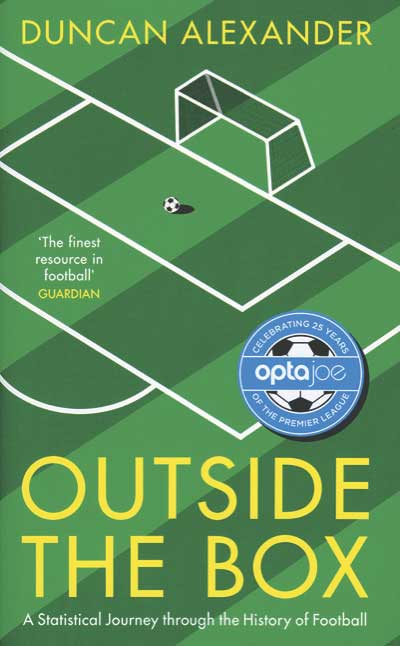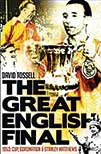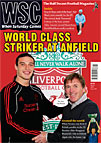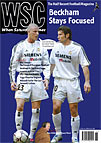
by Duncan Alexander
Cornerstone, £16.99
Reviewed by Gordon Cairns
From WSC 369, November 2017
Buy the book

by Duncan Alexander
Cornerstone, £16.99
Reviewed by Gordon Cairns
From WSC 369, November 2017
Buy the book
{youtube}zIRkNfj8sSQ{/youtube}
from around 1.25
 1953: Cup, Coronation and Stanley Matthews
1953: Cup, Coronation and Stanley Matthews
by David Tossell
Pitch, £16.99
Reviewed by Charles Robinson
From WSC 319 September 2013
Sixty years on, no cup final has yet matched the game in 1953 in which Blackpool beat Bolton 4-3 with a late intervention from the incomparable Stanley Matthews. In The Great English Final author David Tossell relates the full story of this famous day, weaving social and economic history with the tale of the game to great effect.
Aside from the match reports which bookend the chapters, not just of the game itself but of the rounds leading up to the final, Tossell expertly discusses a range of issues which touch on the modern game. In one chapter, he addresses players’ wages and the challenges that big-name stars, such as Stan Mortensen – scorer of a hat-trick in the 1953 final – went through to secure a decent wage and to protect themselves against their inevitable and oncoming retirement. Although, in Matthews’s case, that wouldn’t happen for a few years yet.
Another topic that exercises Tossell is that of the supposed tactical naivety of British football in the post-war period. As he explains, 1953 was the year not only of the coronation of Elizabeth II but also the year of England’s famous and chastening defeat by Hungary. This disastrous result could have heralded a period of deep introspection, of the kind wished for by many England fans today. However, the author argues that English football fans were more concerned with entertainment than with sophisticated displays of tactical ingenuity after many years of war, hardship and suffering.
Despite that, Tossell also highlights the reckless attacking philosophy of the Blackpool manager Joe Smith, at the same time revealing the profound differences between the methods of managers in that post-war period to our own. The captain of the team was much more significant in those days and a delightful early chapter on Blackpool skipper Harry Johnston demonstrates this.
Of course, the book leans towards Blackpool, Matthews and his incredible achievements. The narrative is compelling, as the 38-year-old Matthews, a defeated Wembley finalist twice before, defies age to claim the medal that he promised his father on his deathbed. Interestingly, Tossell also uses contemporary analysis of the game, using Opta statistics to show that Matthews was, in fact, not the most effective player on the field. Ernie Taylor, Mortensen and Bolton’s Willie Moir, among others, were all more productive according to the modern analysis.
Nonetheless, the final is fittingly described as the Matthews Final. Tossell derides the contemporary media for skewing and distorting any soundbite from players and managers so as to fit in to some predetermined story. But the Matthews tale gripped the nation and even the Bolton players and supporters celebrated with him. Matthews was a genuine star before the media obsession with football and the cult of celebrity that blights the modern game. Tossell, rightly shortlisted many times for the British Sports Book awards, tells a riveting story of social and sporting history, weaving his narrative strands inwards towards that famous late goal scored not by Matthews, but by one Bill Perry, another forgotten hero of that famous day.
 Gordon Strachan is gone and Darren Ferguson has been sacked. But while these two clubs plod on through deeply disappointing seasons a single point is useful to neither, writes Harry Pearson
Gordon Strachan is gone and Darren Ferguson has been sacked. But while these two clubs plod on through deeply disappointing seasons a single point is useful to neither, writes Harry Pearson
Opta produce an impressive array of football statistics designed to help professionals analyse the game. One thing the stat-collectors ignore, however, is the number of times the blokes behind you yell “Show some passion”, “Where’s your pride in the jersey?” or simply “Jesus Christ, man”. Though it’s hard to know for sure, I have a feeling this might prove a more reliable guide to what has really transpired in a match than a possession pie chart and a bar graph comparing pass completion.
The blokes behind me in the North Stand at the Riverside stadium are the sort of grizzle-gizzarded, gravel-voiced 40-something gang whose belligerent community spirit was once summarised by a friend of mine as: “Let me buy you a pint, or I’ll kick your teeth in.” Nick Hornby observed that a football crowd is “always teetering on the edge of rage”. That was in north London. This is Teesside. These people stopped teetering long ago. The first exasperated howl of “You bag of shite”, directed at Boro’s Kris Boyd, comes after 90 seconds. Some may feel this is indecently hasty and unfair, but only those who have not watched the former Rangers striker in what passes for action.
The lumbering forward was apparently on the shopping list of the new owners of Blackburn Rovers. Possibly Venky’s were planning to dust him in breadcrumbs and deep fry him. If they had it would barely have affected the Scot’s mobility. “I wouldn’t pay him in washers,” a friend says at half-time, evoking the spirit of everyone’s dad, who would also “not have opened the curtains to watch this rubbish if they were playing in the back garden” either.
At the start of the season few pundits or fans would have picked this fixture as a relegation dogfight, but things haven’t quite worked out as forecast. Gordon Strachan has stalked out of the manager’s office at the Riverside leaving behind an expensively assembled squad of players – predominantly from Scotland – who seem more adept at picking up injuries than points. His successor, local hero Tony Mowbray, seems to have arrested the slide, though not dramatically enough to make anyone aspire to anything grander than mid-table mediocrity.
At Deepdale just after Christmas Boro showed sparks of life, hammering a struggling Preston 3-1. It was a result that precipitated the firing of North End boss Darren Ferguson, after less than a year in charge, and some predictably scathing comments from his father. Since then Mowbray’s team have steadily improved and come into today’s game unbeaten in four league matches that have seen them draw with promotion hopefuls Norwich and Leeds. Preston, meanwhile, have hit a run of form that has left them marooned at the bottom. The hasty departure of the mighty Jon Parkin the moment the transfer window opened in January added to the sense of foreboding.
Despite Boro’s mini-revival there’s still a lot of raw emotion in the cold, damp air of Middlehaven. David Wheater, a centre-back in the Mowbray mould, has just been sold to Bolton for £2 million. He’s yet another product of the famous youth system to be sold off, joining Adam Johnson, Stewart Downing, Lee Cattermole and James Morrison. At Watford another former Boro youth-teamer, Danny Graham, has hit 18 goals so far this season, more than the whole current Boro forward line put together. Maybe that’s why there is grumbling that things are slipping out of control and talk of the dark days of the mid-1980s.
It’s something newly installed Preston boss Phil Brown seems to have tapped into. Earlier in the week he’d suggested that Boro are in such dire financial straits the players haven’t been paid. Preston North End’s hierarchy have offered an apology and Brown has retracted his remarks. “He’s trying to play Fergie-style mindgames,” someone remarks in the pub before the match, “only he hasn’t got a mind.” The blokes behind me are less subtle. “Sit down you tangerine Mackem twat,” one of them roars as Brown remonstrates with the referee about some minor infringement.
As the first half wears incoherently on, the blokes behind me get ever more irate. Spectators sitting near them start to find alternative seating (and there’s plenty available). “I’m here to support my team and I’m going to fucking support them,” one of the men bellows as an elderly couple decide to move a few rows further down to avoid being deafened by the outrage. “You should get behind the…” one of his mates growls in support, breaking off to howl “Use your flaming eyes, you Jock get” at Barry Robson, who has failed to spot his team-mate Tony McMahon on the right.
I am too overcome with torpor to go anywhere. I’ve paid £26 to sit in a seat where my view of the opposite penalty area is blocked by the crossbar. Boro are attacking at the opposite end of the field. Or at least I think they are attacking. The lack of elevation has limited my perspective. When Nicky Bailey collects the ball and advances, I have no idea whether he is 40 yards or 20 yards from goal. “Get a fucking shot off,” the blokes behind me roar, but that is hardly proof of anything.
Eventually Bailey does shoot – the highlights reveal it is from 30 yards or so – Andy Lonergan in the North End goal dives to his right to save and then leaps back up again to thwart Leroy Lita’s effort from the rebound. A long shot from Paul Parry that Jason Steele tips round the post is Preston’s best effort and it’s perhaps a summary of how things have been that the four teenage boys sitting in front of me get up and go to queue for burgers in the 35th minute.
At half-time I move to another seat near the back of the stand. Perhaps it’s the better view or the better company, but the game seems to improve immeasurably in the second period. After an hour Boro bring on “Magic” Marvin Emnes for the ponderous Boyd. The Dutchman is all pace and movement, flicks and tricks. He looks like a genius, but when he’s put clear through on goal, to the left of the penalty spot, he somehow manages to slice his shot ten yards wide of the far post and you see why Sparta Rotterdam didn’t fight to keep him.
His presence, along with that of the neat and industrious Julio Arca, a half-time replacement for Robson, livens Boro up, though. The passing is neat and slick, and invariably ends up with right-back Tony McMahon firing in a cross. Preston, for whom former Middlesbrough loanee Sean St Ledger has a decent game, deal with most of them comfortably enough, however, and when they don’t Boro’s players end up getting in each others way. “No one’s gambling on the near post,” you find yourself saying, like you were Alan Shearer, or something.
In the 71st minute Boro centre-back Matthew Bates – another youth academy product and a senior figure these days after what seems like years out following a run of bad luck with knee injuries – gets the ball just inside the Preston half. He slips through or around practically the entire visiting midfield and, then, perhaps mindful of his forwards’ frailties, elects to slap a shot at goal from the edge of the box. There’s not much pace to it, and it’s only a yard or so to Lonergan’s right, but the keeper misjudges his dive hopelessly and the ball squeezes under him and into the net.
Boro are ascendant now and Lita has a chance to kill the game off when Joe Bennet’s cross reaches him four yards out. He sidefoots the ball goalwards, but Lonergan somehow gets across to block – a brilliant save that, alongside the double stop in the first half, makes his dismal effort with Bates’s goal all the more puzzling.
Middlesbrough knock the ball around after that without really creating any chances. They seem content to play out time. They’ve shown an inability to finish off teams and retain a knack of conceding late goals that’s hung around since Gareth Southgate was in charge. Understandably the crowd become anxious. “Too deep. Too deep” people around me scream as Boro drop back onto the edge of their box whenever Preston get the ball. With two minutes of the game remaining Conor McLaughlin breaks down the right for the visitors and whips in a cross. In the Middlesbrough goal, Steele hesitates, half comes for the ball and then darts back again. He’s disoriented when North End centre-half Billy Jones stoops to head towards goal, and the ball bounces past his flailing legs and into the net.
For a moment I experience that familiar sense of disbelief that inevitably comes in the silence filling the gap between a visiting team scoring and the angry yelling of the home support when reality sinks in. As the outrage bursts out around me, Brown runs onto the field, turns around and raises his arms in triumph towards the Preston directors in the West Stand. “Where’s your sunbed gone?” the North Stand chants as the Preston boss is ordered back into his technical area by the fourth official.
Brown is unabashed. He seems to relish his role as villain in the Championship pantomime. Well, it’s the spotlight, I suppose. Preston remain bottom, Boro are five places above them. In 2006 they were in the UEFA Cup final. If that seemed amazing at the time, it appears even more so now.
From WSC 289 March 2011
 Saturday 3 Man Utd beat Arsenal 1-0 in their FA Cup semi-final at Villa Park, Paul Scholes scoring to deny the holders a fourth successive final. “We didn't deserve to lose,” says Arsène, graciously. “I wouldn't bet on them on Tuesday night,” says Sir Alex, employing spare mind games on behalf of Claudio Ranieri. In the league, Chelsea win 1-0 at Spurs to cut Arsenal’s lead to four points. In his first start for six months, Jamie Redknapp needs plastic surgery after being accidentally punched in the mouth by his cousin Frank Lampard. Newcastle take fourth off Liverpool with a 4-2 win over Everton. Wolves lose 4-1 at home to Southampton; Claus Lundekvam scores his first goal in 296 games for the Saints. At the bottom of the First, Derby lose 1-0 to a disputed penalty at home to Walsall. Wimbledon end a run of 11 straight defeats and stave off relegation for a few days by beating Wigan 1-0. In the game of the day in the Second Division, 19,041 see Bristol City beat QPR 1-0 to draw level on points in the automatic promotion race behind Plymouth, who stay seven points clear despite a 1-0 loss at Barnsley. At the bottom Brentford and Chesterfield draw 1-1, both goals in the final minute, but slip below Peterborough, Grimsby and Stockport, who all win. Wycombe stay alive with a 2-1 win at home to Port Vale. “The lads are going through brick walls,” explains Tony Adams. In the Third Doncaster extend their lead with a 3-1 defeat of Bury, while Carlisle narrow the gap at the bottom with a 2-1 win at Swansea. In Scotland Celtic open up a 20-point lead over Rangers, coming from two down to draw with Hearts.
Saturday 3 Man Utd beat Arsenal 1-0 in their FA Cup semi-final at Villa Park, Paul Scholes scoring to deny the holders a fourth successive final. “We didn't deserve to lose,” says Arsène, graciously. “I wouldn't bet on them on Tuesday night,” says Sir Alex, employing spare mind games on behalf of Claudio Ranieri. In the league, Chelsea win 1-0 at Spurs to cut Arsenal’s lead to four points. In his first start for six months, Jamie Redknapp needs plastic surgery after being accidentally punched in the mouth by his cousin Frank Lampard. Newcastle take fourth off Liverpool with a 4-2 win over Everton. Wolves lose 4-1 at home to Southampton; Claus Lundekvam scores his first goal in 296 games for the Saints. At the bottom of the First, Derby lose 1-0 to a disputed penalty at home to Walsall. Wimbledon end a run of 11 straight defeats and stave off relegation for a few days by beating Wigan 1-0. In the game of the day in the Second Division, 19,041 see Bristol City beat QPR 1-0 to draw level on points in the automatic promotion race behind Plymouth, who stay seven points clear despite a 1-0 loss at Barnsley. At the bottom Brentford and Chesterfield draw 1-1, both goals in the final minute, but slip below Peterborough, Grimsby and Stockport, who all win. Wycombe stay alive with a 2-1 win at home to Port Vale. “The lads are going through brick walls,” explains Tony Adams. In the Third Doncaster extend their lead with a 3-1 defeat of Bury, while Carlisle narrow the gap at the bottom with a 2-1 win at Swansea. In Scotland Celtic open up a 20-point lead over Rangers, coming from two down to draw with Hearts.